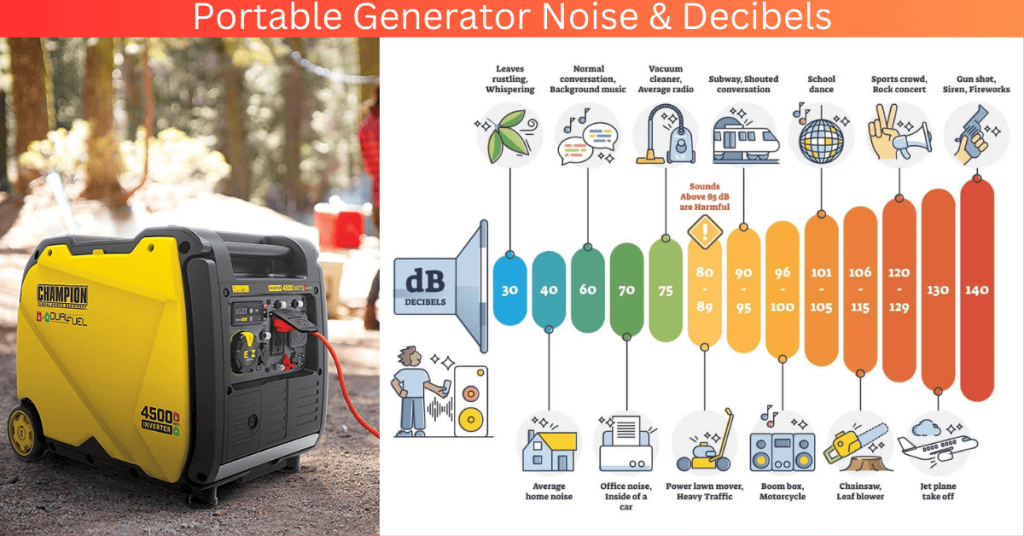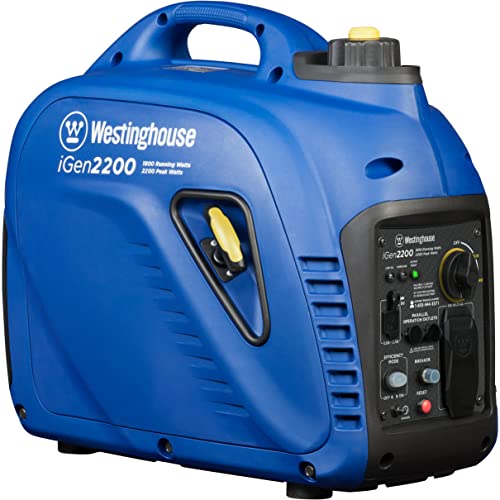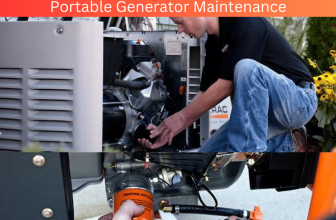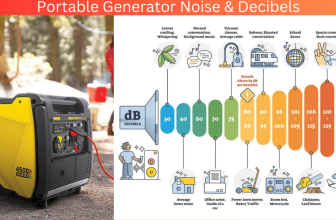
Portable generators have become essential tools for many households and businesses, providing power during outages or when electricity is unavailable. However, noise impact is a significant concern that often goes overlooked.
In this blog post, we will dive deep into the world of portable generator noise levels, exploring their consequences on wildlife habitats and human health while presenting effective reduction strategies to keep your environment more peaceful.
By understanding the effects of generator noise and implementing solutions to minimize it, you can enjoy reliable power without sacrificing your peace and quiet.
Key Takeaways
- Understanding decibel levels and noise measurements are crucial for assessing the impact of portable generators on our surroundings.
- Portable generators can produce high levels of noise, reaching up to 100 decibels, which can cause negative effects on wildlife and natural habitats as well as health effects such as neuroendocrine, cardiovascular, respiratory, and digestive system problems from prolonged exposure.
- Regulations for portable generator noise levels are in place to reduce the harmful effects of excessive noise. Using sound barriers or soundproof enclosures and choosing a quieter model are effective strategies for reducing generator noise pollution. Adhering to regulations is also important to ensure compliance with local ordinances and prevent excessive noise pollution.

Understanding Noise Levels And Decibels
Decibels and noise measurements are used to understand the loudness of sounds, with louder sounds having higher decibel levels; factors such as distance, environment, and frequency can also affect noise levels.
Decibels And Noise Measurements
Understanding decibels and noise measurements is crucial to assessing the impact of portable generators on our surroundings. Decibels (dB) are the units used to measure sound levels, with a sound level increase of 10 dB being perceived as twice as loud by our ears.
In order to determine the noise produced by your generator, you would need an instrument called a sound level meter. This device helps identify how loud a generator’s noise emissions are compared to other familiar sources like cars passing by on a highway or heavy machinery at work.
Measuring generator noise levels not only allows us to understand potential risks related to exposure but also supports informed decision-making when selecting the right equipment for your needs.
Factors That Affect Noise Levels
Understanding the factors that affect noise levels is crucial in managing the impact of portable generators on our surroundings. As a potential customer, you should be aware of these factors to make informed decisions when purchasing or using a generator. The main aspects that influence noise levels include:
- Generator size and power output: Larger generators with higher power outputs produce more noise than smaller, less powerful units.
- Engine type: Diesel generators tend to be louder than their gasoline or propane counterparts due to their more robust engines and higher compression ratios.
- Exhaust system: The design and quality of the exhaust system can significantly impact the noise emitted by a generator. Better-designed systems with mufflers can reduce noise levels considerably.
- Generator enclosure: Open steel frame generators tend to be noisier than those enclosed in sound-attenuating materials or cases.
- Distance from the source: Noise levels decrease as you move further away from the generator, so proper placement is essential for minimizing its impact on surrounding areas.
- Surface reflections and absorption: Sound can reflect off hard surfaces, such as walls and pavement, while softer materials like grass or soil absorb sound more readily. Choosing a suitable location for your generator can help reduce its overall noise impact.
- Surrounding environment: Background noise from other sources may also contribute to perceived generator noise levels.
- Weather conditions: Wind direction and weather conditions like rain or snow can alter how sound travels and consequently affect overall noise perception.
- INTERNAL COMBUSTION AND FUEL INJECTION SYSTEMS
- HARMONIC DISTORTION AND VIBRATION ANALYSIS
The Noise Impact Of Portable Generators
Portable generators can produce high levels of noise, reaching up to 100 decibels, which can cause negative effects on wildlife and natural habitats, as well as health effects such as neuroendocrine, cardiovascular, respiratory, and digestive system problems from prolonged exposure.
But don’t worry; in this article, we will discuss the regulations and techniques for reducing generator noise so that you can make informed choices for residential or commercial use.
Decibel Levels Of Common Portable Generators
In this section, we will explore the decibel levels of some common portable generators to give you an idea of what to expect when using them. Here is a table presenting the approximate decibel levels of popular portable generator models:
| Generator Model | Decibel Level (dB) |
|---|---|
| Honda EU2200i | 48-57 dB |
| WEN 56200i | 51 dB |
| Champion 75537i | 58 dB |
| Westinghouse iGen2200 | 52 dB |
| Briggs & Stratton Q6500 | 66 dB |
| Yamaha EF2000iSv2 | 51.5 dB |
Keep in mind that these decibel levels are taken at a certain distance, usually 23 feet, from the generator. As you move further away from the generator, the noise level decreases. It is also important to remember that generator noise levels may vary depending on factors such as load and environmental conditions.
Negative Effects On Wildlife And Natural Habitats
As much as portable generators offer convenience and flexibility, they come with some negative environmental effects that are worth considering. One of the primary negative impacts is on wildlife and their habitats.
The noise emitted by a generator can cause significant stress to creatures in surrounding areas.
Besides, generator fumes also harm wildlife. Carbon monoxide emissions from a running generator can be poisonous for birds and small mammals living close by or in confined spaces such as dens or nests.
For these reasons, it’s important always to consider the location before setting up a portable generator. Try finding an area away from animal dens or nesting sites when possible.
Health Effects Of Prolonged Exposure To Loud Generator Noise
It’s essential to understand the potential health effects of prolonged exposure to loud generator noise. Exposure can lead to neuroendocrine, cardiovascular, respiratory and digestive system issues.
Chronic exposure can result in an increase in stress hormones, which may cause high blood pressure and heart disease.
Studies show that people exposed to high levels of generator noise for long periods may develop hearing loss or tinnitus (ringing in the ears). It’s crucial before operating a portable power generator, you take adequate measures such as wearing earplugs or earmuffs.
In conclusion, the negative health effects associated with prolonged exposure to loud generator noises cannot be overstated.
Regulations And Noise Reduction Techniques
Regulations for portable generator noise levels are in place to reduce the harmful effects of excessive noise. Discover how you can effectively reduce generator noise by using sound barriers, insulated extension cords and other innovative technologies.
Noise Regulations For Portable Generators
Portable generators must meet noise level standards set by the EPA and the CARB. Manufacturers must provide noise level data for their generators. Most states have noise ordinances that limit how much noise a generator can make.
The maximum allowable sound level varies by state and location.
Some cities require a permit to run a generator, and the permit may include specific noise restrictions. Generator users are responsible for complying with local regulations and ensuring that their generator is not causing excessive noise pollution.
Use Of Noise Barriers And Soundproof Enclosures
One way to reduce noise impact from portable generators is by using noise barriers and soundproof enclosures. Here are some important points to note:
- Noise barriers such as fencing, walls, and vegetation can be used to deflect and absorb the sound waves generated by the generator.
- Soundproof enclosures made of materials such as fibreglass or acoustic foam can reduce noise levels significantly by blocking out external noise.
- Portable soundproof tents or covers can be used for easy transportation of the generator while minimizing noise impact.
- When selecting a noise barrier or enclosure, it is crucial to choose one that is specifically designed for use with a generator and does not impede ventilation or cause overheating.
- Regular maintenance of the barrier or enclosure is necessary to ensure it remains effective in reducing the generator’s noise.
By using these strategies, you can effectively mitigate the negative impacts of generator noise on your surrounding environment.
Innovative Generator Technology
As technology advances, so do the innovations of generator manufacturers to provide quieter power solutions. Silencers are one such example, which use a muffler system to decrease noise levels while still providing efficient energy output.
Other generators feature internal combustion technologies and fuel injection systems that also reduce noise pollution.
Additionally, new soundproof enclosures can be used as a solution to further reduce noise levels from portable generators. These enclosures work by using acoustic panels or special insulation materials that absorb sound waves through resonance absorption, reducing overall decibel levels emitted by the generator.
Noise Reduction Strategies For Residential And Commercial Use
There are several strategies for reducing noise from portable generators, including choosing a quiet generator, proper placement and distance, regular maintenance and tune-ups, use of insulated extension cords, and more.
Choosing A Quiet Generator
If you’re in the market for a portable generator, it’s important to consider how much noise it will make. Here are some tips for choosing a quiet generator:
- Look for generators with lower decibel levels. The quieter the generator, the less likely it is to disturb your neighbours or cause hearing damage with prolonged use.
- Consider inverter generators, which are typically quieter than traditional generators and produce cleaner power output.
- Choose a generator with an enclosed design or sound-dampening features. These types of generators tend to be quieter as they reduce vibrations and muffle sound.
- Think about your specific needs when selecting a generator size and type. Generally, smaller generators are less noisy than larger ones, but they may not have enough power output for certain appliances or equipment.
- Read reviews from other customers to get an idea of how loud a particular generator actually is in practice.
Remember that noise reduction should not be the only factor you consider when selecting a portable generator. Other factors, such as fuel efficiency, durability, and safety, are also important to keep in mind.
Proper Placement And Distance
Proper placement and distance are crucial to reducing the noise levels of portable generators. Here are some important tips:
- Place the generator on a level surface that is at least 15 feet away from any occupied building.
- Position the generator so that its exhaust points away from people and buildings.
- Keep the generator away from windows and outdoor living areas, especially during use.
- Use extension cords to connect appliances to the generator, ensuring that they are rated for outdoor use.
- Never operate a generator indoors or in an enclosed space.
- Make sure that the generator has proper ventilation to prevent overheating and ensure safe operation.
- Consider using a soundproof enclosure or barrier to reduce noise levels further.
By following these guidelines, you can help minimize noise pollution and maintain a safe environment when operating your portable generator.
Regular Maintenance And Tune-ups
As a generator owner, it’s important to ensure that your machine is operating efficiently and effectively to prevent noise pollution. Here are some simple tips for regular maintenance and tune-ups:
- Schedule regular maintenance: Follow the manufacturer’s guide for scheduled maintenance to keep your machine running correctly.
- Check the oil level: Keep an eye on your generator’s oil levels and change it as necessary.
- Inspect the air filter: A clogged air filter can cause your generator to work harder, creating more noise. Make sure to regularly inspect and clean or replace the air filter.
- Adjust fuel mixture: Ensure that the fuel-air mixture is correct by adjusting carburetor settings if necessary.
- Tighten loose components: Check all fasteners, nuts, and bolts to make sure they’re tight and secure.
By following these tips, you can help reduce noise pollution caused by generator operation while also ensuring that your machine is running smoothly and efficiently.
Use Of Insulated Extension Cords
Insulated extension cords can be an effective strategy for reducing the noise impact of portable generators. By using a high-quality insulated cord, you can decrease electrical resistance and reduce energy loss, which results in less generator noise.
These cords are also designed to dampen vibrations and reduce signal interference, providing a quieter power supply.
One example is the use of heavy-duty outdoor extension cords with built-in circuit breakers and extra insulation to prevent damage from exposure to moisture or extreme temperatures when used outdoors.
Additionally, it’s important to choose the right length of cord to minimize voltage drops while still maintaining safety distances between your home or business and the generator itself.
Noise Concerns For Construction Sites
If you work in construction, then you know that portable generators are essential for powering tools and equipment on job sites. However, they can be very noisy and disruptive to the surrounding community.
Many localities have noise ordinances in place that limit sound levels during certain hours of the day.
To minimize noise pollution from generator use during construction projects, it is important to choose a quiet generator model specifically designed for construction sites.
Proper placement of the generator away from residential areas, workplaces, or schools will help keep noise levels under control. Additionally, using insulated extension cords and keeping up with regular maintenance and tune-ups will prevent unnecessary increases in decibel levels over time.
Noise Restrictions For Outdoor Events
If you are planning an outdoor event and considering using a portable generator, it’s important to be aware of noise restrictions that may be in place. Here are some tips to help you stay compliant:
- Check local noise ordinances: Many cities and towns have specific regulations regarding acceptable levels of noise during certain hours or in certain areas. Be sure to check these regulations before scheduling your event.
- Choose a quiet generator: When selecting a generator, look for models that are designed to operate quietly. Some generators include special features like soundproofing or exhaust mufflers that can reduce noise levels significantly.
- Proper placement and distance: The location of the generator can also affect overall noise levels. Place the generator as far away from the event space as possible and direct the exhaust away from guests.
- Use insulated extension cords: Use heavy-duty extension cords with insulation to reduce vibration and further minimize noise levels.
- Schedule around restricted hours: If there are specific times when excessive noise is not allowed, try to schedule your event outside of those hours to avoid any issues or complaints.
Remember, excessive generator noise can be disruptive not just for your guests but also for nearby residences and businesses. By following these guidelines, you can still enjoy the convenience of portable power without creating a nuisance for others.
Conclusion: Effective Strategies For Reducing Generator Noise
In conclusion, understanding the impact of portable generator noise is crucial for those who use them. Factors such as decibel levels, environmental impact, and health effects have been examined in this article.
With proper placement, regular maintenance, and the use of noise barriers or soundproof enclosures, one can significantly reduce generator noise.
Additionally, choosing a quieter model and adhering to regulations are other effective strategies for reducing noise pollution caused by portable generators.
How loud are portable generators, and what is the impact of their noise level?

Portable generators can range in noise levels depending on their size and power output, but they generally emit between 60-80 decibels (dB) when operating. This level of noise can be disruptive to nearby residents and wildlife, potentially causing hearing damage or interrupting sleep patterns.










